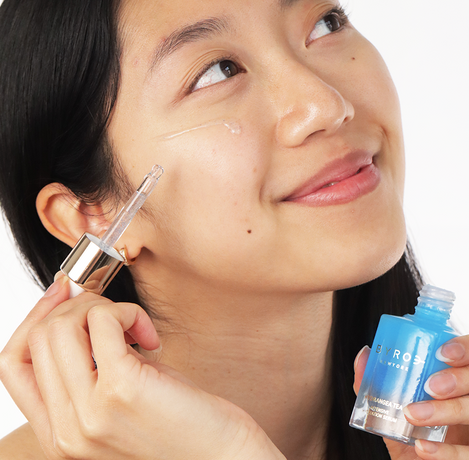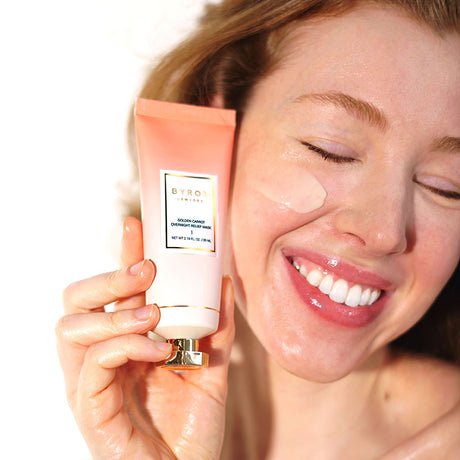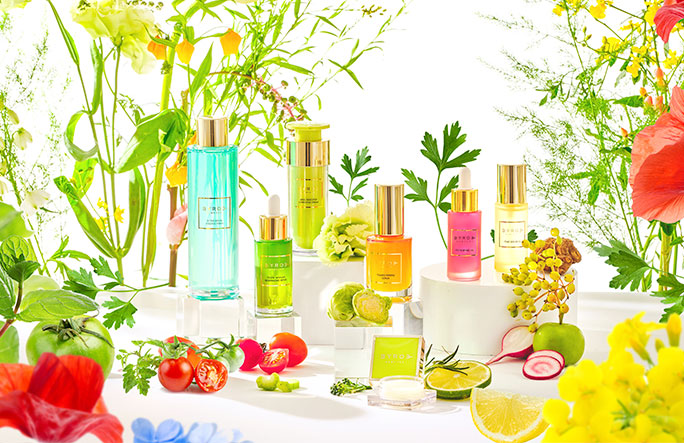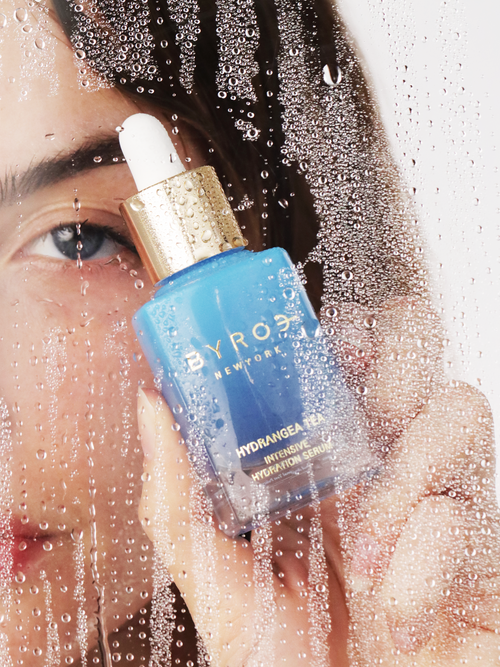How to Tell if You Have
Sensitive Skin
How to Tell if You Have
Sensitive Skin
How to Tell if
You Have
Sensitive Skin
The signs you need to watch out for
At BYROE, we often have customers emailing us for routine and product suggestions and one of the most common questions we get is related to “sensitive skin.” Skincare myths travel fast and are hard to dispel but let’s clear some things up: there’s no such thing as a “sensitive skin type.” Sensitivity can happen to all skin types and believe it or not, that redness and irritation is a skin condition rather than a label you need to box yourself in with. To help make some sense of it all, we reached out to Dr. Joshua Zeicher, Director of Cosmetic and Clinical Research at Mount Sinai Hospital in NYC.
Q: What is sensitive skin? And why does it occur?
“I would define sensitive skin as an intolerance to personal care products and to the environment. Some people develop redness, burning, and stinging when they apply skincare products. Other people develop similar symptoms when they are exposed to extremes such as hot and cold weather” But, ultimately, “sensitivity is determined by your genetics and some people [just] have a weaker skin barrier than others.”
But, Dr. Zeichner warns that “if you are suffering from redness and flushing where you are developing red bumps or pustules it’s possible that you have more than just sensitivity and actually have a condition called Rosacea.” In this case, “a board-certified dermatologist can help give you prescription medications to manage it.”
Q: What ingredients are good for sensitive skin?
“If you have sensitive skin look for skincare products that repair the skin barrier and reduce inflammation. Ingredients like colloidal oatmeal and ceramides help seal in cracks in the outer skin layer” which helps your skin defend itself from potentially irritating triggers. “Niacinamide, the form of vitamin B3 that reduces inflammation in the skin, is another go to for people who are sensitive.” You can even use “botanicals like licorice root extract [and Centella Asiatica] for their [natural] anti-inflammatory properties.” Glycerin is another great option as “it’s like a sponge that pulls in hydration [to the] skin effectively hydrating and soothing it.”
Q: What ingredients should people with sensitive skin avoid?
“If you have sensitive skin stick to gentle, hydrating cleansers and avoid exfoliating products that can disrupt the outer skin layer” and do not skip out on moisturizing! Zeichner explains that it is essential to “make sure to apply a moisturizer twice daily” as it will help to fortify and maintain a healthy skin barrier and reduce your skin’s overall sensitivity.
SPF is another must to avoid any weather-based irritation. In this case, “consider a mineral-based sunscreen that contains iron oxide. Mineral sunscreens tend to be less irritating than chemical ones.” But, overall, he suggested a “less is more approach [as] using too many products or too many harsh ingredients can make sensitivity worse.”
💛 LONG STORY SHORT
Dealing with sensitive skin is rough but with the right routine and the right ingredients, you’ll have happier, healthier skin in no time. But, be sure to pay attention to your skin and always patch test before using new products so you can get a better understanding of what triggers your sensitivity.
The signs you need to watch out for
At BYROE, we often have customers emailing us for routine and product suggestions and one of the most common questions we get is related to “sensitive skin.” Skincare myths travel fast and are hard to dispel but let’s clear some things up: there’s no such thing as a “sensitive skin type.” Sensitivity can happen to all skin types and believe it or not, that redness and irritation is a skin condition rather than a label you need to box yourself in with. To help make some sense of it all, we reached out to Dr. Joshua Zeicher, Director of Cosmetic and Clinical Research at Mount Sinai Hospital in NYC.
Q: What is sensitive skin? And why does it occur?
“I would define sensitive skin as an intolerance to personal care products and to the environment. Some people develop redness, burning, and stinging when they apply skincare products. Other people develop similar symptoms when they are exposed to extremes such as hot and cold weather” But, ultimately, “sensitivity is determined by your genetics and some people [just] have a weaker skin barrier than others.”
But, Dr. Zeichner warns that “if you are suffering from redness and flushing where you are developing red bumps or pustules it’s possible that you have more than just sensitivity and actually have a condition called Rosacea.” In this case, “a board-certified dermatologist can help give you prescription medications to manage it.”
Q: What ingredients are good for sensitive skin?
“If you have sensitive skin look for skincare products that repair the skin barrier and reduce inflammation. Ingredients like colloidal oatmeal and ceramides help seal in cracks in the outer skin layer” which helps your skin defend itself from potentially irritating triggers. “Niacinamide, the form of vitamin B3 that reduces inflammation in the skin, is another go to for people who are sensitive.” You can even use “botanicals like licorice root extract [and Centella Asiatica] for their [natural] anti-inflammatory properties.” Glycerin is another great option as “it’s like a sponge that pulls in hydration [to the] skin effectively hydrating and soothing it.”
Q: What ingredients should people with sensitive skin avoid?
“If you have sensitive skin stick to gentle, hydrating cleansers and avoid exfoliating products that can disrupt the outer skin layer” and do not skip out on moisturizing! Zeichner explains that it is essential to “make sure to apply a moisturizer twice daily” as it will help to fortify and maintain a healthy skin barrier and reduce your skin’s overall sensitivity.
SPF is another must to avoid any weather-based irritation. In this case, “consider a mineral-based sunscreen that contains iron oxide. Mineral sunscreens tend to be less irritating than chemical ones.” But, overall, he suggested a “less is more approach [as] using too many products or too many harsh ingredients can make sensitivity worse.”
💛 LONG STORY SHORT
Dealing with sensitive skin is rough but with the right routine and the right ingredients, you’ll have happier, healthier skin in no time. But, be sure to pay attention to your skin and always patch test before using new products so you can get a better understanding of what triggers your sensitivity.
The signs you need to watch out for
At BYROE, we often have customers emailing us for routine and product suggestions and one of the most common questions we get is related to “sensitive skin.” Skincare myths travel fast and are hard to dispel but let’s clear some things up: there’s no such thing as a “sensitive skin type.” Sensitivity can happen to all skin types and believe it or not, that redness and irritation is a skin condition rather than a label you need to box yourself in with. To help make some sense of it all, we reached out to Dr. Joshua Zeicher, Director of Cosmetic and Clinical Research at Mount Sinai Hospital in NYC.
Q: What is sensitive skin? And why does it occur?
“I would define sensitive skin as an intolerance to personal care products and to the environment. Some people develop redness, burning, and stinging when they apply skincare products. Other people develop similar symptoms when they are exposed to extremes such as hot and cold weather” But, ultimately, “sensitivity is determined by your genetics and some people [just] have a weaker skin barrier than others.”
But, Dr. Zeichner warns that “if you are suffering from redness and flushing where you are developing red bumps or pustules it’s possible that you have more than just sensitivity and actually have a condition called Rosacea.” In this case, “a board-certified dermatologist can help give you prescription medications to manage it.”
Q: What ingredients are good for sensitive skin?
“If you have sensitive skin look for skincare products that repair the skin barrier and reduce inflammation. Ingredients like colloidal oatmeal and ceramides help seal in cracks in the outer skin layer” which helps your skin defend itself from potentially irritating triggers. “Niacinamide, the form of vitamin B3 that reduces inflammation in the skin, is another go to for people who are sensitive.” You can even use “botanicals like licorice root extract [and Centella Asiatica] for their [natural] anti-inflammatory properties.” Glycerin is another great option as “it’s like a sponge that pulls in hydration [to the] skin effectively hydrating and soothing it.”
Q: What ingredients should people with sensitive skin avoid?
“If you have sensitive skin stick to gentle, hydrating cleansers and avoid exfoliating products that can disrupt the outer skin layer” and do not skip out on moisturizing! Zeichner explains that it is essential to “make sure to apply a moisturizer twice daily” as it will help to fortify and maintain a healthy skin barrier and reduce your skin’s overall sensitivity.
SPF is another must to avoid any weather-based irritation. In this case, “consider a mineral-based sunscreen that contains iron oxide. Mineral sunscreens tend to be less irritating than chemical ones.” But, overall, he suggested a “less is more approach [as] using too many products or too many harsh ingredients can make sensitivity worse.”
💛 LONG STORY SHORT
Dealing with sensitive skin is rough but with the right routine and the right ingredients, you’ll have happier, healthier skin in no time. But, be sure to pay attention to your skin and always patch test before using new products so you can get a better understanding of what triggers your sensitivity.











Comments (0)